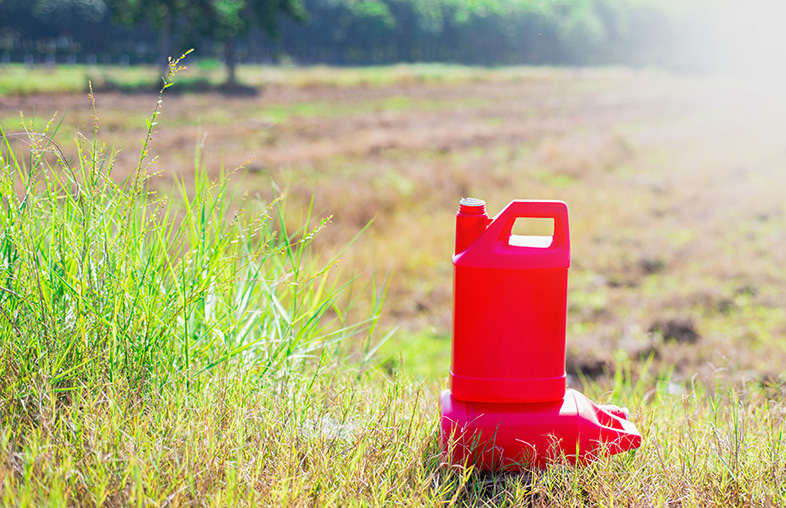If you’ve tuned into national news coverage or have read the paper within the last few years, you’ve likely heard of lawsuits and legal discussions about the popular weed killer, Roundup. However, between contradictory statements about the safety of glyphosate—the active ingredient in Roundup—and the fact that the Roundup products have remained on store shelves, many people are still asking: How toxic is Roundup?
What Is Roundup?

As noted by AgriPulse, glyphosate was originally used to clean mineral deposits out of pipes and boilers. In 1961, glyphosate was patented in the U.S. by Stauffer Chemical Co. for this use. A few years later, a scientist from Monsanto Chemical Works discovered that glyphosate was also effective in killing weeds and patented it for that use. In 1974, glyphosate was first made available to American consumers under the name Roundup.
The potential toxicity of glyphosate is not new knowledge. In 1985, the Environmental Protection Agency classified glyphosate as a Class C carcinogen, meaning “it has suggestive evidence of carcinogenic potential.” This designation, however, was abruptly changed in 1991 to Class E, which indicates that there is evidence of non-carcinogenicity for humans.
While experts tried to determine just how carcinogenic Roundup is, Monsanto’s product continued to do extremely well. The company began genetically modifying organisms to make crops more resistant to being harmed by weed killers.
“Roundup Ready genetically modified soybeans, canola, and cotton were also available for American farmers, with the intention of Roundup being the herbicide of choice for use on those crops. Throughout the early 2000s, more “Roundup Ready” seeds were available for farms growing sugarbeets and alfalfa.
In 2016, the first Roundup lawsuit was filed in California by a groundskeeper who alleged that exposure to glyphosate caused him to acquire non-Hodgkin lymphoma. Later that year, Bayer acquired Monsanto for $63 billion.
In 2018, a jury determined that Monsanto failed to warn users of the dangers associated with the herbicide. That first lawsuit resulted in a jury award for $289 million, with $39.2 for compensatory damages and $250 million in punitive damages.
A judge upheld that verdict but reduced the punitive damages awarded so that the total award was $78.5 million. In recent years, numerous other lawsuits have been filed, and Bayer has begun settling those claims.
How Toxic Is It?
Whether Roundup is toxic depends on who you ask. Some government agencies insist that Roundup poses few health risks if used as directed. However, courts, scientists, and many individuals suffering harm after long-term exposure to the product beg to differ.
What Officials Say
Despite being ordered to reevaluate the safety of glyphosate-containing products by the U.S. Court of Appeals for the Ninth Circuit, the Environmental Protection Agency (EPA) maintains that the product presents no risks or concerns for human health that require on-label warnings. Further, the EPA states that their scientists have not detected an increased risk to children before birth or after. There has been no evidence to suggest that glyphosate causes cancer, according to the agency, or that it is an endocrine disruptor.
What the Research Shows
According to Scientific American, Roundup is the number one weed killer in the U.S. Around 100 million pounds of the product’s active ingredient, glyphosate, is applied to U.S. farms, lawns, and fields annually. Glyphosate has been long suspected of being carcinogenic in certain circumstances in which the user of the product—or even those living or working in an area where the product is frequently used—has an increased risk of certain types of cancer due to prolonged exposure.
However, new findings indicate that users or those exposed to Roundup face even more toxic risks due to the inert ingredients used in the product and the combination of those ingredients with glyphosate. Scientists discovered that these inert ingredients amplified the effects of glyphosate, even when the ingredients were diluted to lower concentrations than what is needed to kill weeds in lawns or fields.
One of the ingredients of particular concern, polyethoxylated tallow amine, or POEA, is more toxic to human embryonic, placental, and umbilical cord cells than even the herbicide itself, Scientific American reported.
The research team from France’s University of Caen suspects that this toxicity can cause problems in pregnancy by interfering with hormonal production, which can lead to abnormal fetal development, low birth weight, or even miscarriage. The team believes that the authorizations that permit the sale of this herbicide worldwide need to be revised due to the clear indication that the product’s toxicity is multiplied by other compounds used in the mixture.
What Kinds of Cancer and Other Health Risks Have Been Linked to Roundup Use?
According to the Interdisciplinary Center for Exposures, Diseases, Genomics, and Environment at the University of Washington, exposure to glyphosate increases the risk of non-Hodgkin lymphoma by 41 percent.
Non-Hodgkin lymphoma is a cancer that grows in the body’s lymph system. This type of cancer can grow and spread at different rates and be indolent or aggressive. As noted by the National Cancer Institute, the disease is more common in older males with weakened immune systems and can present with symptoms such as swollen lymph nodes, fever, night sweats, weight loss, and fatigue.
An additional study that concluded recently at Indiana University’s School of Medicine noted that 99 percent of the pregnant women they studied in the midwest carried glyphosate in their bodies. The glyphosate exposure was associated with shortened pregnancies, which can result in low birth weight and other health risks attributed to prematurity. These findings echoed earlier studies from the school and from other university research teams across the U.S.
The Product Is Leaving Store Shelves This Year
In 2021, Bayer announced that it would begin pulling Roundup products intended for residential use from the store shelves in 2023 to reduce the number of lawsuits related to the safety of glyphosate. However, the company noted that the product would remain available for agricultural use. In a press release, the company stated, “This move is being made exclusively to manage litigation risk and not because of any safety concerns.”
A report from The Counter noted that the company at that time faced around 125,000 legal claims from those who attributed their non-Hodgkin lymphoma diagnosis or the diagnosis of other types of cancer to exposure to the product.
At the time of the report, Bayer had settled all but around 30,000 of those claims. Many of the claims against the company involved individuals who did not receive a cancer diagnosis for as many as 15 years after exposure to the product.
Additional Roundup lawsuits will come against Bayer in the years to come, The Counter reported. The company told its shareholders that it intended to set aside $4.5 billion to resolve future claims.
How to File a Roundup Cancer Claim
Those diagnosed with non-Hodgkin lymphoma or have acquired issues in pregnancy that they believe are linked to exposure to Roundup still have the opportunity to file a Roundup claim to obtain compensation for the expenses and psychological impacts of their illness.
While some of the claims that have been filed involve residential exposure to the chemical, many claims involve the use of Roundup on the job by farmers, landscapers, and other agricultural workers. Lawsuits have been filed individually, and there have also been class action claims featuring lawsuits by many different claimants with the same set of facts that are joined into one case.
To begin the claims process, speaking with a personal injury lawyer with experience in Roundup or other product liability claims is important. They can help you understand your eligibility to seek compensation through the claims process and can also assist you in gathering the documents you need to prove your claim.
For a successful claim, you must prove you suffered long-term exposure to Roundup, either by your occupation or due to living near a place where high levels of the product were frequently used. For example, if an individual acquired non-Hodgkin lymphoma and spent years living beside an agricultural field where Roundup was frequently applied, there is a good case to be made for potential long-term exposure.
You will also need to present documents showing the expenses and impacts you incurred due to the illness linked to glyphosate exposure. These documents may include expenses such as medical bills, transportation to medical appointments, proof of wage loss, etc. Additionally, your legal team can help calculate the sum of lost future earning capacity stemming from your diagnosis, and quality-of-life impacts you experienced as a result of the illness. An experienced product liability lawyer has a legal team that can help gather these documents.
Your legal team can provide you with many other services as you navigate the Roundup claims process, such as ensuring that your lawsuit is filed within the state’s statute of limitations and negotiating a settlement on your behalf. If Bayer refuses to pay your claim, your attorney can also represent you in court.
How Long Does a Roundup Lawsuit Take?
How long your case will take depends on several factors. One of those factors involves how highly your claim is valued. Higher-valued claims generally take longer to settle, but settlements generally involve a shorter process than lawsuits.
Most Roundup claims have settled out of court, and many have already received the proceeds from these settlements. Other factors include the time it takes to value your claim, which is determined by the time needed for your condition to stabilize and the expenses of your treatment to be fully realized.
Additionally, if your claim is joined with others as multi-district litigation or class action, the timeline of a resolution can be extended due to the logistics of preparing and presenting cases involving multiple claims.
Can You File a Claim Without an Attorney?

Product liability refers to the responsibility of manufacturers to protect consumers from unreasonable risks posed by defective products, even when those products are used as directed.
In addition to other actions meant to protect consumers from harm, manufacturers must warn users of all health risks associated with using the product. The crux of the claims against Roundup so far is that the company failed to warn consumers of the potential risk of cancer and other medical issues that could arise from on-label use of the product.
While it would seem that a non-Hodgkin lymphoma diagnosis following prolonged exposure to Roundup would be a simple enough thing to prove, it is important to understand that legal processes are rarely ever simple, as they not only require an extensive amount of document gathering but they also feature insurers, defense attorneys and companies that have a significant financial interest in never admitting that they were wrong, in never acknowledging the harm that was caused, and in making claims go away as quietly and cheaply as possible.
Having an experienced lawyer who understands the legal process involved in this type of claim and is confident enough to go up against these high-powered companies, insurers, and attorneys, to obtain the compensation their clients need is a key ingredient in a successful Roundup claim.
If doctors diagnosed you with non-Hodgkin lymphoma after prolonged Roundup use, contact a lawyer for your free case evaluation.